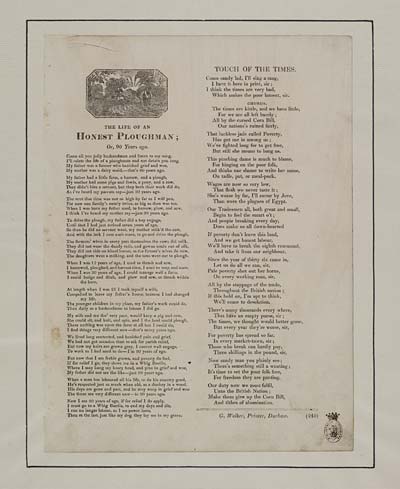Occupations
Life of an honest ploughman; or, 90 years ago
Download files
Individual page:

[NLS note: a graphic appears here - see image of page]
THE LIFE OF AN
HONEST PLOUGHMAN;
Or, 90 Years ago.
Come all you jolly husbandmen and listen to my song,
I'll relate the life of a ploughman and not detain you long,
My father was a farmer who banished grief and woe,
My mother was a dairy maid,—that's 90 years ago.
My father had a little farm, a harrow, and a plough,
My mother had some pigs and fowls, a pony, and a cow,
They didn't hire a servant, but they both their work did do,
As i've heard my parents say—just 90 years ago.
The rent that time was not so high by far as I will pen,
For now one family's nearly twice, as big as then was ten,
When I was born my father used, to harrow, plow, and sow,
I think I've heard my mother say—just 90 years ago.
To drive the plough, my father did a boy engage,
Until that I had just arrived seven years of age,
So then he did no servant want, my mother milk'd the cow,
And with the lark I rose each morn, to go and drive the plough,
The farmers' wives in every part themselves the cows did milk,
They did not wear the dandy veils, and gowns made out of silk,
They did not ride on blood horses, as the farmer's wives do now,
The daughters went a milking, and the sons went out to plough.
When I was 15 years of age, I used to thrash and sow,
I harrowed, ploughed, and harvest time, I used to reap and mow,
When I was 20 years of age, I could manage well a farm,
I could hedge and ditch, and plow and sow, or thrash within
the barn,
At length when I was 25 I took myself a wife,
Compelled to leave my father's house, because I had changed
my life.
The younger children in my place, my father's work could do,
Then daily as a husbandman to labour I did go.
My wife and me tho' very poor, would keep a pig and cow,
She could sit, and knit, and spin, and I the land could plough,
There nothing was upon the farm at all but I could do,
I find things very different uow—that's many years ago.
We lived long contented, and banished pain and grief,
We had not got occasion then to ask for parish relief,
But now my hairs are grown grey, I cannot well engage,
To work as I had used to do—I'm 90 years of age.
But now that I am feeble grown, and poverty do feel,
If for relief I go, they shove me in a Whig Bastile,
Where I may hang my hoary head, and pine in grief and woe,
My father did not see the like—just 90 years ago.
When a man has laboured all his life, to do his country good,
He's respected just as much when old, as a donkey in a wood,
His days are gone and past, and he may weep in grief and woe
The times are very different now—to 90 years ago.
Now I am 90 years of age, if for relief I do apply,
I must go to a Whig Bastile, to end my days and die,
I can no longer labour, as I no power have,
Then at the last just like my dog, they lay me in my grave.
TOUCH OF THE TIMES.
Come sandy lad, I'll sing a sang,
I have it here in print, sir ;
I think the times are very bad,
Which makes the poor lament, sir.
CHORUS.
The times are kittle, and we have little,
For we are all left barely ;
All by the cursed Corn Bill,
Our nations's ruined fairly,
That luckless jade called Poverty,
Has got sae in among us ;
We've fighted long for to get free,
But still she means to bang us.
This pinching dame is much to blame,
For hinging on the poor folk,
And thinks nae shame to write her name,
On tadle, pat, or meal-pock.
Wages are now so very low,
That flesh we never taste it ;
She's worse by far, I'll swear by Jove,
Than were the plagues of Egypt.
Our Tradesmen all, both great and small,
Begin to feel the smart o't ;
And people breaking every day,
Does make us all down-hearted
If poverty don't leave this land,
And we get honest labour,
We'll have to break the eighth command,
And take it from our neighbour.
Since the year of thirty six came in,
Let us do all we can, sir,
Pale poverty shot out her horns,
On every working man, sir,
All by the stoppage of the trade,
Throughout the British nation ;
If this hold on, I'm apt to think,
We'll come to desolation.
There's many thousands every where,
That have an empty purse, sir ;
The times, we thought would better grow,
But every year they're worse, sir,
For poverty has spread so far,
In every market-town, sir ;
Those who break can hardly pay,
Three shillings in the pound, sir,
Now sandy man you plainly see ;
There's something still a wanting ;
It's time to set the poor folk free,
For freedom they are panting.
Our duty now we must fulfil,
Unto the British Nation ;
Make them give up the Corn Bill,
And tithes of abomination.
G. Walker, Printer, Durham. (245)
Set display mode to:
![]() Universal Viewer |
Universal Viewer | ![]() Mirador |
Large image | Transcription
Mirador |
Large image | Transcription
Images and transcriptions on this page, including medium image downloads, may be used under the Creative Commons Attribution-NonCommercial-ShareAlike 4.0 International Licence unless otherwise stated. ![]()
| English ballads > Occupations > Life of an honest ploughman; or, 90 years ago |
|---|